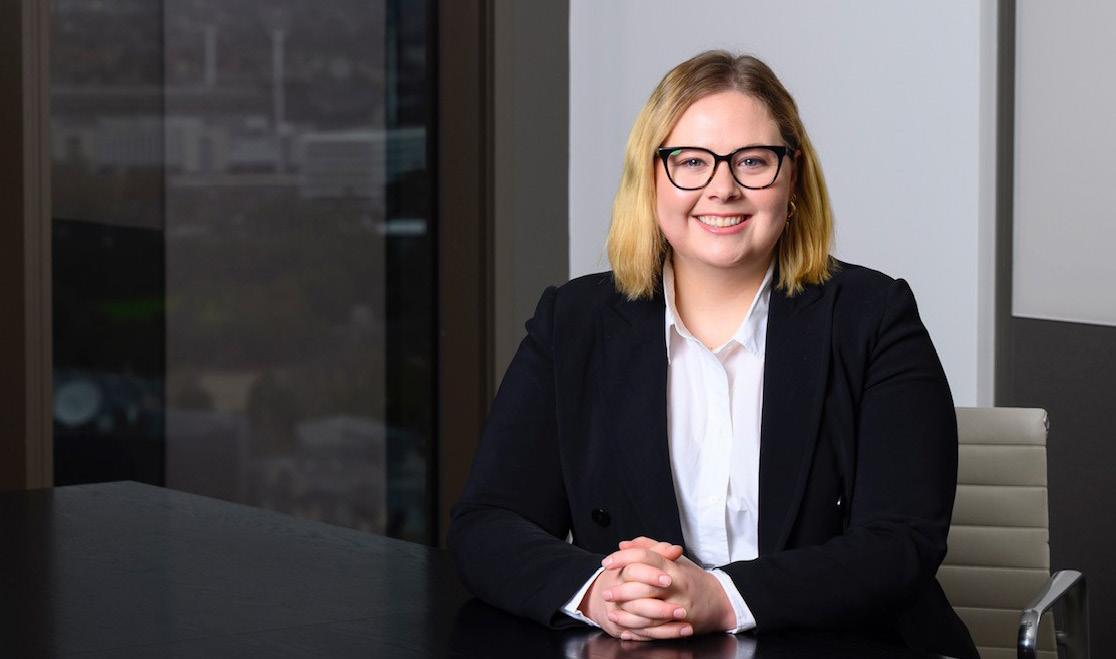
5 minute read
Embracing the squiggly line
We recently caught up with Stephanie Parsons, our 2022 Old Lauristonians’ Association Fellowship recipient. After leaving Lauriston in 2011, Steph completed a Bachelor of Film & Television at the Victorian College of the Arts and later, a Juris Doctor at Monash University.
Steph has a keen interest in not-for-profit work, and through her work as a commercial lawyer and in the film industry, she has recently joined the board of Channel 31, Melbourne’s long-running community television broadcaster.
Congratulations on being awarded the 2022 Old Lauristonians’ Association Fellowship. Can you tell us a little bit about why you applied and how the Fellowship will help you achieve your goals and contribute to the wider community?
Thank you. I am incredibly excited to receive the Fellowship. I recently joined the board of directors of Channel 31, Melbourne’s long-running not-for-profit community television channel. I became aware immediately that despite my legal background, the reality of working on a board (especially a charitable board) is very different. I am planning to undertake directorship training using the Fellowship funds, to ensure I can be an effective board member and contributor to Channel 31.
We often tell our students that their career pathways may not be straight or predictable and that every experience helps lead to the next. What has been your journey since leaving Lauriston and how have you have integrated your passions and talents into your career?
After graduating high school, I studied a Bachelor of Film & Television at the Victorian College of the Arts. I had a wonderful time and worked in the film industry (predominantly in the camera team, but in many roles) for the following few years. I eventually decided that I would like some more stability and job security, and I went to postgraduate law school. I now work as a commercial lawyer.
The essential filmmaking skills – teamwork, emotional intelligence, focused creativity – help me every day as a lawyer. But my legal skills are also assisting me in my film career, which is running parallel to my legal career. The only reason I was accepted to join the board of Channel 31 was because of the combination of legal and filmmaking skills, and my legal skills assist me to project manage film productions and communicate my ideas effectively.
I am surprised every day by how the two skillsets interact. I am also incredibly grateful to have two, mostly distinct, areas of interest.
It’s clear you are passionate about encouraging women to put their hand up for leadership roles. How did your time at Lauriston help lay the foundation for you to seek these opportunities?
At Lauriston, I was given an environment of frequent opportunity and much encouragement. I was encouraged to engage with my specific interests (media, the arts, humanities) without the sense that other subjects were more worthy. The teachers, equally, were incredibly interested in their work. Growing up in an environment where you are allowed to experiment, make mistakes, and interrogate your ideas instilled a sense of self-belief and curiosity that I think has stayed with many people I went to school with, including me. I think curiosity, and being unafraid to admit you are still learning, are traits which are inherent in many people who seek leadership positions.
On reflecting upon your time at Lauriston, what other skills or influences from your time at school have you drawn upon in your life and in your career?
I think the safety and intimacy of small classrooms has left me with a good ability to make friends, speak to people, back my views and maintain a sense of self between groups. I also think Howqua contributed to my pervasive feeling that ‘everybody people’; Howqua broke down any preconception or bias I held against the other friendship groups in my year, and since that time I have never lost the sense that everyone is redeemable. I also suspect it contributed to the ability to deal with other people crying.
You recently spoke to our graduating Class of 2022. Can you share with us the advice your gave them as they embark on the next stage of their lives?
I would hardly call it advice – more a litany of errors and humiliations – but I tried to summarise some of the things I have learned in the 10 years since I graduated high school. In short, I encouraged them to value their personal skills and strengths, no matter how unimpressive those may seem now; it is their idiosyncrasies which will become their advantages.
I also encouraged them not to fall into the trap of believing that just because you are good at something (or that you enjoy it), it should be your career. Often, making a career of the thing you love will commodify it and sap you of the creative energy you had for it. This was an experience I had in the film industry; as much as I love being on set, being on set full time is draining and has poor job security. I am enjoying my film career significantly more since I realised I do not have to do it full time.
Finally, I encouraged them to seek out people who think differently to them. Without venturing into the paranoid, today, it is very easy to get trapped in algorithm echo chambers which feed your own opinions back to you. I am also firmly of the (very lawyerly) belief that to properly interrogate one’s own beliefs, it is important to understand the criticisms of them. The easiest way to achieve this is by listening to people who hold different views and see the world differently.










